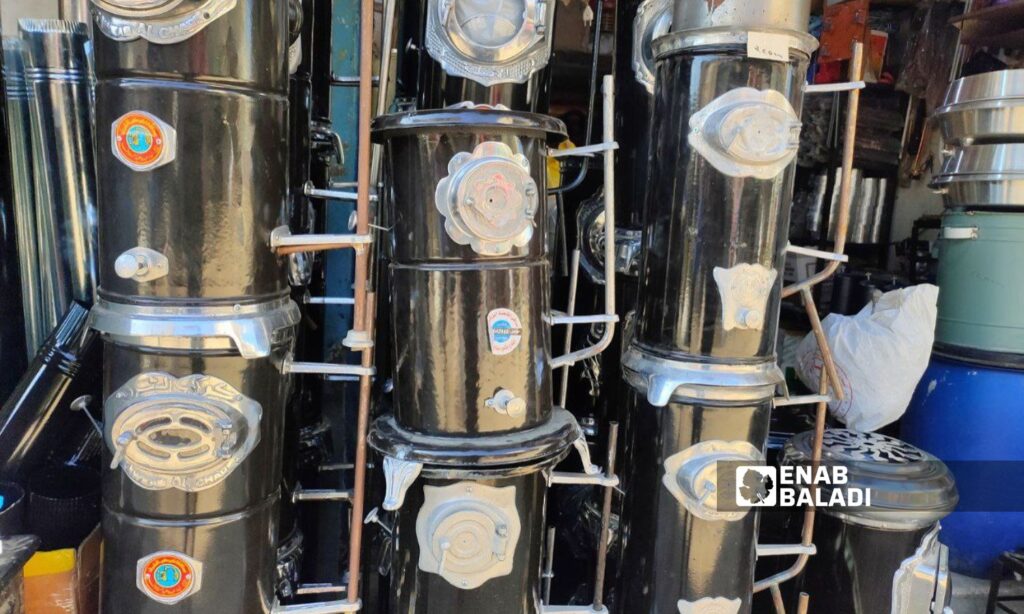For years, repairing his old heater has become a mandatory option for 40-year-old Abid al-Majool, a resident of Qamishli. Despite his desire to buy a new heater, high prices prevent him from doing so.
Al-Majool, who works in a local warehouse, told Enab Baladi that he decides at the beginning of each winter season to get rid of his old heater, which often malfunctions and leaves his family facing the cold. However, every time he decides to repair it and changes his mind about buying a new one due to the high prices.
He mentioned that the option of repairing the heater costs a considerable amount compared to his monthly income, which does not exceed one million Syrian pounds (about 65 US dollars).
He described the living situation as “unbearable,” as he barely manages to secure a meal for his family, questioning how he could afford a new heater that costs the equivalent of his entire monthly salary.
This year, heater prices in Qamishli have increased amid difficult economic conditions, making securing heaters a real challenge for residents.
Prices vary by type and size
According to Enab Baladi‘s observations, the prices of heaters vary from one store to another, as well as by type and size. Large heaters that include parts made of copper can reach a price of 1.5 million Syrian pounds (about 100 US dollars), while medium-sized ones are priced at one million and fifty thousand pounds (about 70 US dollars).
The price of large heaters that include aluminum parts is 850 thousand pounds (about 56 US dollars), medium-sized ones cost 600 thousand (about 44 US dollars), and small heaters are priced at 400 thousand (about 27 US dollars).
Prices for heater accessories, like pipes and elbows, have also risen; for instance, the price of a white pipe reaches 15 thousand pounds, an elbow costs 10 thousand pounds, and a black pipe goes for 28 thousand Syrian pounds.
Suad al-Hussein (49 years old), a resident of Qamishli, complained about the price discrepancies. She told Enab Baladi that the variation reflects a lack of price regulation in the market.
Based on her experience, she believes that store owners control the prices based on the dollar rate and do not even adhere to the official exchange rate, often calculating the dollar at a higher value “to ensure that the merchant makes more profit at the expense of the citizen.”
There is a market for selling used parts and accessories, and it is popular among residents, according to al-Hussein, as it is one of the solutions that poor families or those with limited income resort to.
Heaters on display for sale in one of the stores in Qamishli – November 21, 2024 (Enab Baladi/Majd al-Salem)
Prices “are not in the seller’s hands”
Shop owners argue that the problem lies not only in the prices but in the decline of the purchasing power of citizens and the overall deteriorating economic conditions.
Mohammed al-Rajab (38 years old), a store owner specializing in heating equipment in Qamishli, told Enab Baladi that rising prices are not solely in the seller’s hands, as there are several reasons behind it, including the rise in the prices of raw materials needed for manufacturing, labor costs, shipping, and the depreciation of the Syrian pound.
He deemed that no matter how much merchants lower prices, customers will continue to complain due to their difficult economic circumstances.
As for Rasheed Khalid (39 years old), who works in heater maintenance from the town of al-Qhantaniya, he mentioned to Enab Baladi that repairing heaters has become a common option among residents to save on heating expenses.
He said that repair costs vary depending on the malfunction and the parts that need to be replaced. For example, changing the heater’s oven costs 100 thousand Syrian pounds (about 7 US dollars), simply cleaning the heater costs 100 thousand pounds, welding a copper break costs 50 thousand pounds, and replacing the thermal glass costs 25 thousand pounds.
He added that the poor quality of diesel used causes many technical problems in heaters, such as clogging and accumulation inside the heater body, which could potentially lead to fires if periodic maintenance is not conducted.
According to information learned by Enab Baladi from local traders, diesel heaters are imported from several sources, including Aleppo, Manbij, and northern Iraq, along with their necessary parts.
There are also local workshops for manufacturing heater accessories like pipes, while electric heaters are mostly of Turkish origin but see less demand due to a scarcity of electricity in the region.

